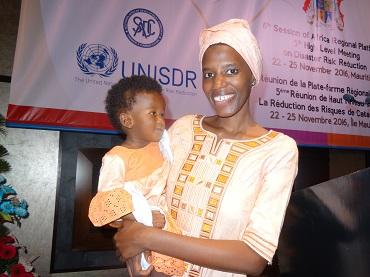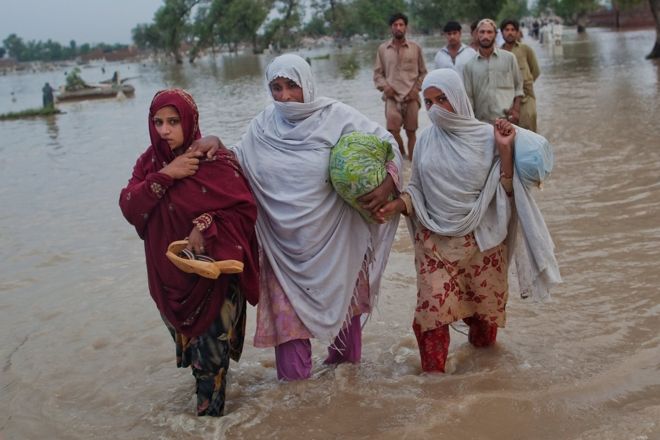International Women's Day: Call for better data on impacts of disasters on women and girls
 Marking International Women’s Day on March 8, UN Special Representative for Disaster Risk Reduction, Ms. Mami Mizutori made an appeal today for UN Member States to provide better data on the impacts of disasters on women and girls. Ms. Mizutori who took over as head of the UN Office for Disaster Risk Reduction (UNISDR) on March 1, stressed the need for a better understanding of the extent to which a disproportionate number of women and girls die or are affected by disasters, allowing governments and civil society organizations to be compelled to make a more conscious effort to ensure that women are recognized as agents of change and better represented in disaster management agencies ... Read more
Marking International Women’s Day on March 8, UN Special Representative for Disaster Risk Reduction, Ms. Mami Mizutori made an appeal today for UN Member States to provide better data on the impacts of disasters on women and girls. Ms. Mizutori who took over as head of the UN Office for Disaster Risk Reduction (UNISDR) on March 1, stressed the need for a better understanding of the extent to which a disproportionate number of women and girls die or are affected by disasters, allowing governments and civil society organizations to be compelled to make a more conscious effort to ensure that women are recognized as agents of change and better represented in disaster management agencies ... Read moreRecognizing issues around gender, and empowering women and drawing on their knowledge, is an essential part of resilience and achieving the globally-agreed 2030 Agenda for Sustainable Development.
The impacts of climate change are not “gender neutral”. In fact, the situation is worst for the most vulnerable: according to the United Nations Framework Convention on Climate Change (UNFCCC), women commonly face higher risks and greater burdens from the impacts of climate change in situations of poverty, and the majority of the world’s poor are women. Women’s unequal participation in decision-making processes and labor markets compound inequalities and often prevent women from fully contributing to climate-related planning, policy-making and implementation.... Read more
Mexico strengthens political dialogue and cooperation with St Lucia
 The Minister of Foreign Affairs of Mexico, Luis Videgaray Caso, and the Prime Minister and Minister of External Affairs of Saint Lucia, Allen Chastanet, led the work of the first meeting of the Mechanism for Consultations on Matters of Common Interest between Mexico and Saint Lucia, during which one of main areas of discussion were climate change and renewable energy. They also spoke on the initiatives presented at the 4th Mexico-CARICOM Summit on the 25th of October 2017, particularly concerning the Mexico-CARICOM Comprehensive Disaster Risk Management Strategy. ... Read more
The Minister of Foreign Affairs of Mexico, Luis Videgaray Caso, and the Prime Minister and Minister of External Affairs of Saint Lucia, Allen Chastanet, led the work of the first meeting of the Mechanism for Consultations on Matters of Common Interest between Mexico and Saint Lucia, during which one of main areas of discussion were climate change and renewable energy. They also spoke on the initiatives presented at the 4th Mexico-CARICOM Summit on the 25th of October 2017, particularly concerning the Mexico-CARICOM Comprehensive Disaster Risk Management Strategy. ... Read more
Interesting Facts The Minister of Foreign Affairs of Mexico, Luis Videgaray Caso, and the Prime Minister and Minister of External Affairs of Saint Lucia, Allen Chastanet, led the work of the first meeting of the Mechanism for Consultations on Matters of Common Interest between Mexico and Saint Lucia, during which one of main areas of discussion were climate change and renewable energy. They also spoke on the initiatives presented at the 4th Mexico-CARICOM Summit on the 25th of October 2017, particularly concerning the Mexico-CARICOM Comprehensive Disaster Risk Management Strategy. ... Read more
The Minister of Foreign Affairs of Mexico, Luis Videgaray Caso, and the Prime Minister and Minister of External Affairs of Saint Lucia, Allen Chastanet, led the work of the first meeting of the Mechanism for Consultations on Matters of Common Interest between Mexico and Saint Lucia, during which one of main areas of discussion were climate change and renewable energy. They also spoke on the initiatives presented at the 4th Mexico-CARICOM Summit on the 25th of October 2017, particularly concerning the Mexico-CARICOM Comprehensive Disaster Risk Management Strategy. ... Read moreInternational Women's Day: How the 2011 earthquake and tsunami disaster in Japan led to the foundation of Bosai Girls (or Disaster Preparedness Girls), to raise awareness among young people on the importance of disaster and emergency preparedness
Were it not for the 9.0-magnitude earthquake disaster that triggered a tsunami that left more than 20,000 people dead or missing, Ms Misaki Tanaka’s destiny might have been different. Ms Tanaka quit her job at a Tokyo information technology firm and joined an organization which supports disaster victims. She was tasked with helping to plan disaster preparedness exercises, which many saw as repetitive and boring. She set herself a goal: Make these drills interesting, even for young people. That idea led to the creation of Bosai Girls, or Disaster Preparedness Girls, in 2013. Her decision to use the word “girls” in the name reflected the fact that women are particularly vulnerable in times of disaster. If she was to promote her vision of a fun and funky approach to disaster preparedness, Ms Tanaka realized she needed to reach out to young women, who are often the catalyst for new trends... Read more
Studies show that women are more likely than men to be affected by disasters
 UN figures indicate that 80% of people displaced by climate change are women. Roles as primary caregivers and providers of food and fuel make them more vulnerable when flooding and drought occur. In addition, women are more likely to experience poverty worldwide, and to have less socioeconomic power than men. This makes it difficult to recover from disasters which affect infrastructure, jobs and housing. The UN has highlighted the need for gender sensitive responses to the impacts of climate change, yet the average representation of women in national and global climate negotiating bodies is below 30%... Read more
UN figures indicate that 80% of people displaced by climate change are women. Roles as primary caregivers and providers of food and fuel make them more vulnerable when flooding and drought occur. In addition, women are more likely to experience poverty worldwide, and to have less socioeconomic power than men. This makes it difficult to recover from disasters which affect infrastructure, jobs and housing. The UN has highlighted the need for gender sensitive responses to the impacts of climate change, yet the average representation of women in national and global climate negotiating bodies is below 30%... Read more Despite the scientific consensus, there is widespread public controversy about climate change. A recent study by psychologists have found that Conservatives who were less concerned about climate change were less likely to see climate-related words than liberals who were worried about the issue, suggesting patterns of climate change blindness in conservatives. These findings suggest that climate-related communications may be most effective if tailored in a manner accounting for how attentional priorities differ between audiences—particularly those with different political orientations... Read more Link to research paper
Despite the scientific consensus, there is widespread public controversy about climate change. A recent study by psychologists have found that Conservatives who were less concerned about climate change were less likely to see climate-related words than liberals who were worried about the issue, suggesting patterns of climate change blindness in conservatives. These findings suggest that climate-related communications may be most effective if tailored in a manner accounting for how attentional priorities differ between audiences—particularly those with different political orientations... Read more Link to research paper

No comments:
Post a Comment